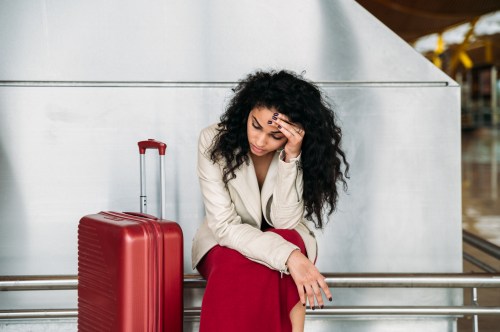Having a fear of flying is nothing new. In fact, some research suggests that up to 40 percent of Americans deal with some form of phobia related to flying on an airplane.1 But, the recent news about plane crashes lately can make even the most confident traveler have flight anxiety. Don't worry—you're not alone.
Experts in This Article
clinical psychologist and co-host of the Mind In View podcast
clinical psychologist at the Center for Anxiety & Women’s Emotional Wellness
assistant professor of psychiatry and director of the Center for the Treatment and Study of Anxiety at the University of Pennsylvania Perelman School of Medicine
chief psychologist at Rutgers University Behavioral Health Care
clinical associate professor of psychiatry at New York Presbyterian Hospital
Flight anxiety is sometimes used interchangeably with aerophobia, which is the official term for a fear of flying.2 “There are a lot of levels around flight anxiety,” says Thea Gallagher, PsyD, clinical associate professor at NYU Langone Health and cohost of the Mind in View podcast. With flight anxiety, some people may feel mildly anxious when it comes to hopping on a plane, while others can have full-on panic attacks, she explains.
If you feel like you can relate to these worries—whether all the time or just right now—we have you covered on why you're feeling anxious in the first place, and some helpful tips you can use before your next flight.
Why a fear of flying is on the rise—at least right now
While a fear of flying may be common, it's worth noting that not everyone is afraid of the same aspect of flying. “Some are afraid of the plane crashing, others are worried about the small space, and some people have a health anxiety, like worrying that they’ll vomit,” Dr. Gallagher says. But given the plane crashes that we've been seeing on the news over the past few weeks, many people are currently experiencing fears of the plane crashing. “I see this often,” says Hillary Ammon, PsyD, a clinical psychologist at the Center for Anxiety & Women’s Emotional Wellness. “It’s more prevalent, given everything in the news lately.”
Having flight anxiety is understandable right now. Within the past three weeks, Americans have seen a devastating plane crash over Washington, D.C. that collided with a helicopter and killed 67 people, a medical jet crash in Philadelphia, and several private plane crashes. On Monday, a plane flying from Minneapolis to Toronto flipped over on the runway at Toronto Pearson International Airport—thankfully, everyone involved in that accident survived.
Why do people feel so anxious, even though plane crashes are rare?
You’ve probably heard this before, but it doesn’t hurt to repeat it: Statistically speaking, flying is the safest way to travel. An MIT data analysis published last year found that the risk of dying from commercial air travel globally between 2018 and 2022 was one in every 13.7 million passengers.3 By comparison, almost 44,000 people passed away in motor vehicle crashes in the U.S. in 2022, which translates to more than 120 people a day, according to data from the Centers for Disease Control and Prevention (CDC).
Plane crashes are rare, but that doesn’t stop many people from being scared of them. “Our brains use heuristics, or quick decision-making, to solve a problem and to make snap judgments about probability,” says Lily Brown, PhD, assistant professor of psychiatry and director of the Center for the Treatment and Study of Anxiety at the University of Pennsylvania Perelman School of Medicine. These quick judgments tend to overly rely on emotional memories and personal experiences, she says. “While statistically, it is extremely more safe to ride on a plane than in a car, our brain has these paired associations of flying with crashing that stir up significant anxiety for many people,” Dr. Brown explains.
When plane crashes make the news, those snap judgments can cause people to cancel flight bookings, delay trips, or avoid traveling altogether. “When plane crashes are in the news, it reminds people that there is a risk while flying and, even more, that you can die while flying,” Dr. Ammon says. “When it seems like there are ‘a lot’ of plane crashes in recent weeks, it makes the perceived risk of a crash seem much higher.”
If you already had a fear of flying, news of yet another plane crash can confirm those fears, says Stephanie Marcello, PhD, chief psychologist at Rutgers University Behavioral Health Care. “Just hearing about a plane crash can make an individual's fears feel more justified and more likely to happen, even though evidence of the number of plane crashes do not support this,” she says. “Humans innately focus on information that seems the most relevant to us and, if they have a belief in their system that flying is dangerous, they might use the plane crash as an example of evidence towards this fear, even though they are not at an increased risk.” This little psychological phenomenon is known as confirmation bias.
Whether you’re suddenly experiencing flight anxiety due to recent events or have been grappling with these fears for a long time, mental health professionals want you to know that there are ways to cope with your worries.
How to ease flight anxiety
Mental health professionals swear it’s possible to learn to live with flight anxiety and keep yourself calm when you're flying. Here are seven tips from our experts that can help you stay grounded even if you're in the air.
Know the stats
Understanding the research can be comforting for some people, Dr. Gallagher says. “Reading how hard it is for planes to crash, how planes are designed to handle turbulence, and knowing the statistics can help,” she says. It’s also a good idea to flip what your brain keeps telling you about recent events, according to Gail Saltz, MD, associate professor of psychiatry at the New York-Presbyterian Hospital Weill Cornell School of Medicine. While many people are focused on the recent crashes “thousands of flights have flown in the same time, unharmed,” Saltz says.
Dr. Gallagher also recommends reminding yourself of this: You probably don’t panic every time you get in a car, even though it’s statistically much more dangerous than flying. “Most people don’t fly every day but many get into a car,” she says. “You habituate that anxiety.”
Talk yourself through it
Positive self-talk can be helpful when you’re dealing with anxiety, Dr. Marcello says. “Remind yourself that even though this plane crash was horrific, it doesn’t have an impact on your flight,” she says. It’s also important to tell yourself that lack of control doesn’t mean the same thing as danger. “Remind yourself that just because you aren’t in control of the plane doesn’t mean it is dangerous,” she says. The more positive thoughts you can get into your head before (and during) your flight, the more you'll start to feel calm when the plane lifts off.
Try grounding exercises
Once you’re on the plane, there are a few exercises you can do to feel grounded and calm. Dr. Ammon recommends doing breathing techniques, like breathing in through your nose for four seconds, out of your mouth for six seconds, and repeating that for two to five minutes. “A neat fact about paced breathing is that it can actually take the body out of fight or flight, and reduce these common symptoms of anxiety,” she says. You can even practice doing this daily leading up to a flight so that you’re used to the breathing technique when you’re buckled in.
Another mind hack Dr. Gallagher recommends is to focus on what’s around you to bring your mind to the present. That may mean thinking about how cozy your sweater is around your arms or how the air flowing from the vent above you feels. These things can help divert your mental energy from worries about the future to what is happening in front of you, she explains.
Pack creature comforts
It’s more than okay to bring things on the plane that make you feel comfortable, like a small weighted blanket or lavender-scented pillow, Dr. Gallagher says. A stress ball or fidget toy can also be helpful, according to Dr. Ammon. “This can further shift focus and relieve tension,” she says. Whatever items you use to calm yourself down when you're at home can be good for the plane too. Just make sure they're TSA-approved.
Dial up the distractions
There’s no reason to sit and stress over your anxiety on a plane. That’s why Dr. Gallagher recommends preparing to distract yourself after you board the flight and during your trip. That can mean saving a fun movie or cool TV series you’ve been wanting to watch for the flight, or having a crossword puzzle handy. Bringing a good book or magazine is also helpful, just in case you can’t use your devices.
Fly with a (calm) buddy
You may not always be able to fly with someone else, and that’s okay. But if you have the choice, it may be helpful to fly with a loved one who isn’t afraid of flying. “Two people being anxious together tends to multiply the anxiety even more,” Dr. Gallagher says. Dr. Saltz even recommends coaching your support person in advance. What you don’t want your loved one to do is to keep reassuring you that everything is fine and that nothing will happen. “It actually provides positive reinforcement for your fear, which makes it worse,” she says. “So, the calm person should just sit and maybe hold your hand or distract you with unrelated chit-chat.”
How to know if your flight anxiety is an actual phobia
“Flight anxiety” isn’t an actual mental health diagnosis, but aerophobia is, Dr. Saltz points out. With flight anxiety, you may have symptoms like stress, worrying, an upset stomach, and wishing you weren’t flying, she explains.
“A phobia is a more extreme version where you’re panicked with physical and emotional symptoms,” Dr. Saltz says. People with aerophobia may start to avoid flying, only fly when drunk or medicated, or feel what Dr. Saltz calls “full-scare terror” while flying. People with aerophobia may also find that their fear can significantly interfere with their lives, causing them to miss important life events or work because of it.
“If you are avoiding flying and it is impacting your life, leisure, or work, it may be beneficial to seek out support from a mental health provider,” Dr. Ammon says. While the tips we listed above can help if you have mild-to-moderate flight anxiety, people with a full-blown phobia may need more professional guidance, like undergoing cognitive behavioral therapy, Dr. Gallagher adds.
The bottom line
It’s completely understandable to feel uneasy about flying right now, given what we've all been witnessing on the news. But, doing your best to process the recent news and having strategic tools in place to help move through your anxiety can help ease those fears and prepare you for takeoff.
- Clark, Gavin I, and Adam J Rock. “Processes Contributing to the Maintenance of Flying Phobia: A Narrative Review.” Frontiers in psychology vol. 7 754. 1 Jun. 2016, doi:10.3389/fpsyg.2016.00754 ↩︎
- Laker, Matthew K et al. “Fear of Flying, Stress and Epileptic-Like Symptoms.” Neuropsychiatric disease and treatment vol. 20 777-782. 2 Apr. 2024, doi:10.2147/NDT.S449342 ↩︎
- Barnett, Arnold et al. "Airline safety: Still getting better?" Journal of Air Transport Management vol. 119 102641. 2024. doi:10.1016/j.jairtraman.2024.102641 ↩︎
Sign Up for Our Daily Newsletter
Get all the latest in wellness, trends, food, fitness, beauty, and more delivered right to your inbox.
Got it, you've been added to our email list.










